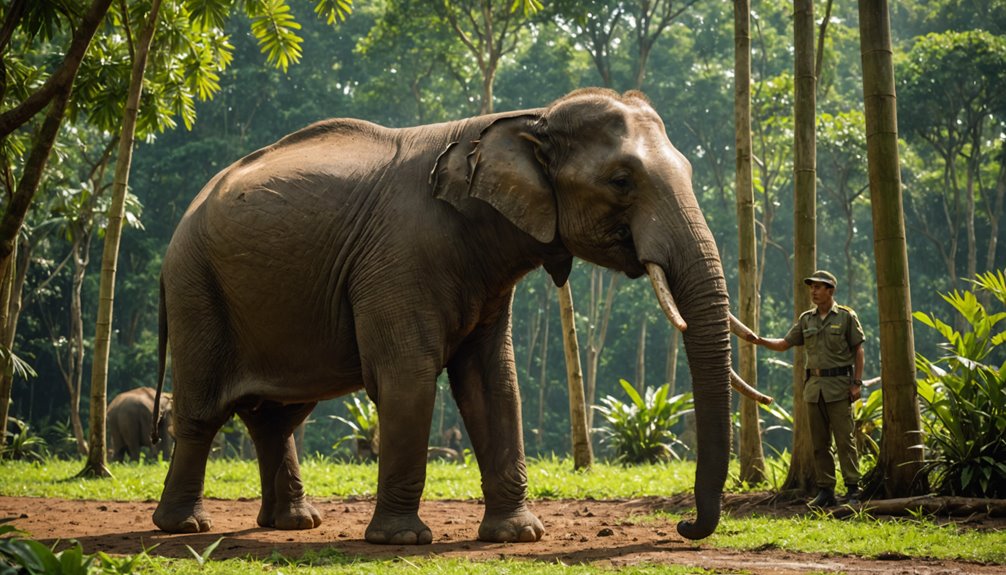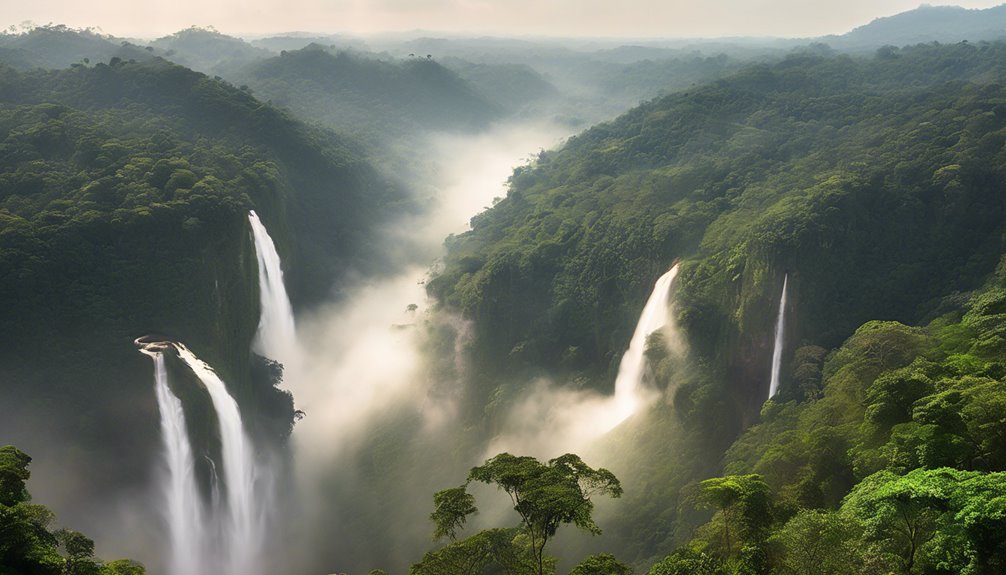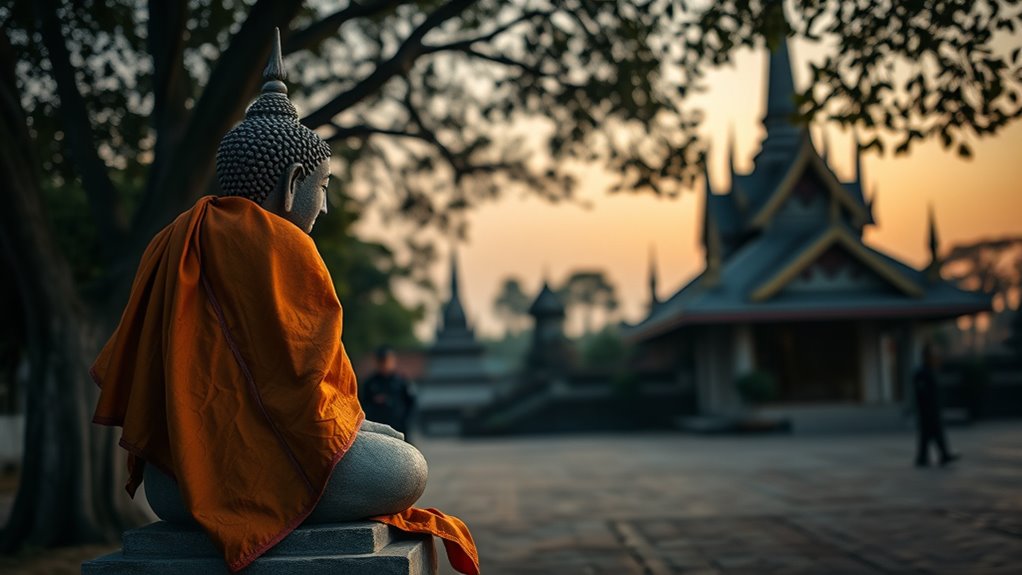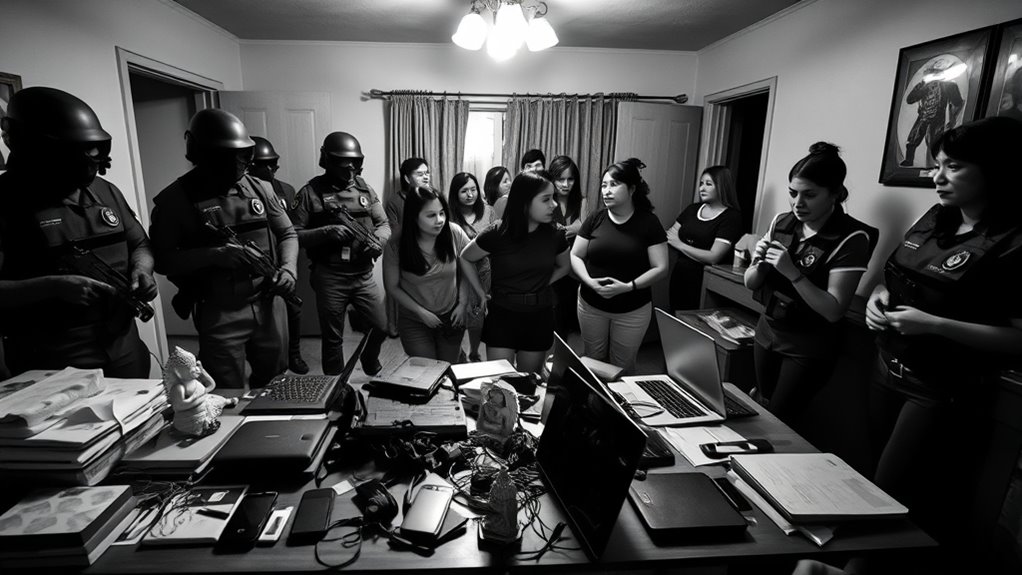Thailand’s ethical elephant sanctuaries provide essential rehabilitation centers for rescued elephants, focusing on conservation and natural behaviors while prohibiting exploitative activities like riding and performances. Leading facilities, including Elephant Nature Park in Chiang Mai and Phuket Elephant Sanctuary, offer visitors opportunities to observe elephants in natural environments through supervised feeding sessions and mud baths. These sanctuaries face ongoing challenges with habitat preservation and operational costs, yet their thorough welfare programs establish standards for responsible wildlife tourism.
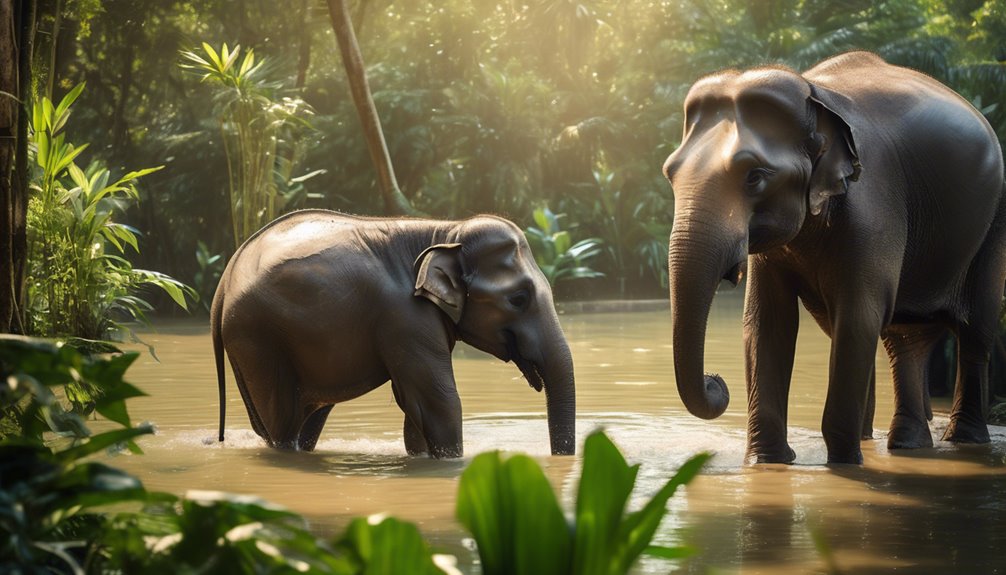
As Thailand grapples with evolving tourism practices and conservation challenges, ethical elephant sanctuaries have emerged as essential centers for the protection and rehabilitation of domesticated elephants previously subjected to exploitation in logging and tourism industries.
These sanctuaries prioritize conservation, prohibiting activities like elephant riding and performances while focusing on natural behaviors and rehabilitation protocols that align with internationally recognized welfare standards.
True sanctuaries protect elephants by banning exploitative activities and implementing scientifically-backed welfare protocols that support natural behaviors.
Leading facilities such as Elephant Nature Park in Chiang Mai and Phuket Elephant Sanctuary demonstrate best practices in elephant care, offering visitors opportunities to observe social behaviors in spacious natural enclosures. These facilities hold deep cultural significance as elephants are considered spiritually powerful beings in Thai society.
These sanctuaries facilitate non-invasive activities including supervised feeding sessions and mud baths, while simultaneously conducting educational programs about elephant conservation, habitat loss, and historical contexts. Visitors can actively participate in food preparation activities that help create enriching bonds with the elephants.
The sanctuaries play critical roles in preserving Thailand’s domestic elephant populations, particularly third and fourth-generation elephants, while advocating against exploitative practices in tourism and logging industries.
Through partnerships with veterinary schools and NGOs, these facilities implement sophisticated health monitoring systems utilizing stress hormone analysis and dung sampling to guarantee peak care for their residents.
Despite their essential conservation work, these sanctuaries face significant challenges, including limited natural habitat due to extensive deforestation, which restricts rewilding possibilities for rescued elephants.
High operational costs for healthcare, food, and land maintenance strain resources, while unethical facilities misrepresenting themselves as legitimate sanctuaries continue to complicate public understanding of genuine conservation efforts.
The sanctuaries maintain sustainability through various initiatives, including reforestation projects and conservation education programs.
They offer volunteering opportunities for visitors to participate in daily care routines and provide overnight stays that include extended learning experiences about rescue and rehabilitation efforts.
These programs not only generate necessary funding but also contribute to public awareness about elephant welfare and conservation needs.
Through their multifaceted approach to conservation, Thailand’s ethical elephant sanctuaries provide a sustainable alternative to exploitative elephant encounters while safeguarding the welfare of rescued elephants.
These facilities serve as models for responsible tourism, demonstrating how conservation efforts can successfully align with meaningful visitor experiences while prioritizing animal welfare above commercial interests.
Frequently Asked Questions
What Documents Do I Need to Enter an Elephant Sanctuary in Thailand?
Visitors require a booking confirmation, either digital or printed, and valid government-issued identification for entry to elephant sanctuaries.
While travel insurance documentation is strongly recommended and may be requested, it varies by location.
Health-related documents, including vaccination records or COVID-19 certificates if applicable, might be necessary, along with signed liability waivers acknowledging safety protocols and risks during the experience.
Can Children Under 5 Years Old Visit Elephant Sanctuaries?
Children under 5 years old can visit most elephant sanctuaries, with many facilities offering free entry for those under 4.
These establishments provide family-friendly experiences, including safe observation activities and guided tours designed for young visitors.
While adult supervision is mandatory, sanctuaries typically accommodate families through shorter program durations, designated viewing areas, and age-appropriate educational activities that promote wildlife conservation awareness.
Are There Wheelchair-Accessible Elephant Sanctuaries in Thailand?
Several elephant sanctuaries in Thailand offer wheelchair accessibility, with notable examples including Elephants World in Kanchanaburi and Phuket Elephant Sanctuary.
These facilities feature hard-packed pathways, canopy walkways, and accessible feeding areas that accommodate wheelchair users.
While some terrain remains uneven, staff assistance is available for traversing specific zones.
The sanctuaries maintain ethical practices while ensuring visitors with mobility challenges can participate in most activities.
What Is the Best Season to Visit Thai Elephant Sanctuaries?
The ideal season to visit elephant sanctuaries is during the cooler dry season from November to February, when temperatures range between 20-30°C.
This period offers pleasant weather conditions, minimal rainfall, and enhanced elephant activity during morning hours.
The moderate climate reduces heat stress on elephants while providing stable conditions for activities.
Though peak tourist season, this timeframe guarantees reliable scheduling and comfortable exploration opportunities.
Do Elephant Sanctuaries Offer Overnight Accommodation for Visitors?
Elephant sanctuaries offer diverse overnight accommodation options, ranging from traditional Thai-style cottages to luxury tented camps and rustic lodges.
Facilities typically include basic amenities such as hot showers, mosquito nets, and private terraces.
Overnight stays incorporate various activities, including elephant feeding, bathing, and cultural experiences with local mahouts.
Accommodations are strategically located in regions like Kanchanaburi, Khao Sok National Park, and near Chiang Mai.
References
- https://www.odynovotours.com/thailand/elephant-sanctuaries.html
- https://www.barcelo.com/guia-turismo/en/thailand/thailand/things-to-do/elephant-sanctuary/
- https://www.mixandmatchtravel.com.au/travel-blog/top-ethical-elephant-sanctuaries
- https://www.littlewanderingwren.com/elephant-hugs-and-more-an-insight-into-thailand-elephant-tourism/
- https://www.responsibletravel.com/holidays/elephant-conservation/travel-guide/elephant-sanctuaries-which-we-do-and-dont-support
- https://aonangelephantsanctuary.com/elephant-preserve/
- https://welovetravel.in/2023/09/visiting-elephant-sanctuaries-in-thailand-what-you-need-to-know-before-you-go/
- https://windandwhim.com/what-you-need-to-know-about-elephant-sanctuaries-in-thailand/
- https://www.worldanimalprotection.org/latest/blogs/thailand-elephants/
- https://www.elephantnaturepark.org/enp/visit-volunteer/projects/half-day-morning-105/view
